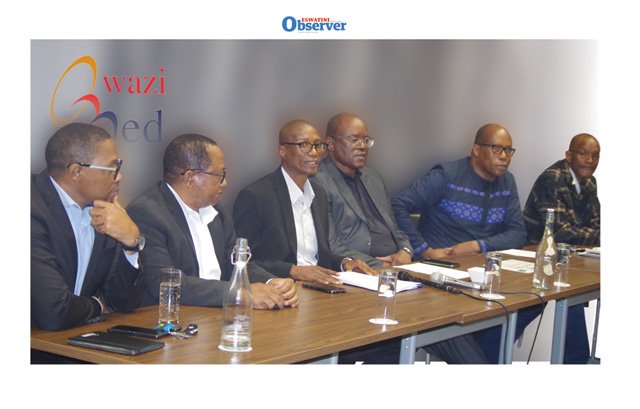By SIFISO NHLABATSI | 2022-12-13

In August 2018, at a rare meeting between Eswatini’s LGBTQI community and religious leaders, most of the 15 pastors in attendance walked out because they were uncomfortable with the discussions.
Since that meeting, some local faith leaders have expressed willingness to meet with and learn more about the needs of lesbian, gay, bisexual, transgender, queer and intersex Emaswati.
Bishop Zwanini Shabalala, Secretary General of the Council of Swaziland Churches, said CSC has always taught that everyone is welcome to worship without any form of discrimination because every human being is created by God in His own image. Yet Shabalala said not all churches are welcoming to the LGBTQI community and cited several occasions where LGBTQI people raised concerns about being mistreated in churches.
"Nowhere in the Bible does it state that if someone is a member of the LGBTQI community, that person must be chased out of the church or discriminated against,” he said.
He explained that CSC’s fellowship of more than 100 churches have clear policies and positions around equality and human rights but no specific position about how LGBTQI people should be treated in places of worship, hence the need to engage in discussions around sexual and gender diversity.
“As the world changes, the CSC is also trying to adapt, and this is not something that can happen overnight,” Shabalala stated.
Pinty Manqoba Dludlu, the Executive Director of TransSwati, said she barely attends church because she works seven days a week teaching people about human sexuality and diversity.
TransSwati is an organisation that works to advance equal rights of transgender people and access to different services without discrimination.
“I strongly believe in the existence of God and believe He made no mistake creating LGBTQI people,” Dludlu stated.
Dludlu said sometime around 2011 she visited a famous church in Zakhele, Manzini, where a pastor said “there are demons in the house,” while praying for her, a remark she considered discriminatory.
“Eswatini has culture and religion at the front, which have and continue to be main perpetrators of stigma and discrimination against LGBTQI people,” Dludlu said.
She explained that some members of the trans community stop going to church or switch churches when gender-segregated activities, socializing, and sitting arrangements force them into boxes where they don’t identify or belong.
Dludlu, who believes churches should be a place of healing, said it’s sad that churches are often places where LGBTQI people are hurt.
“We do have churches that are open and welcoming to LGBTQI people. However, if the leaders perpetuate hate, that makes it easy for the entire church to hate. People hate what they don't understand,” Dludlu stated.
Dludlu said TransSwati has hosted dialogues and sensitization workshops with church leaders who see LGBTQI people in their pews and want to show them love and make them feel comfortable but don’t know how to address them.
“They wanted to help other members embrace the LGBTQI community. This has really been amazing for us,” Dludlu explained.
She said TransSwati hopes to facilitate more such conversations where church leaders can be capacitated on human rights to create an enabling environment for everyone.
Themba Ngozo, Chief Executive Officer of the Eswatini Conference of Churches (COC), said his ecumenical organization opposes discrimination and called on the ministry of health, the LGBTQI community and church leaders to organize dialogue sessions on gender and sexual diversity.
Ngozo said as long as religious leaders are ignorant on the topic there will always be cases of anti-LGBTQI discrimination.
Ezulwini Islamic Centre's Imam, Feroz Ismail echoed Ngozo, saying mosques should offer support to the LGBTQI community.
“Muslims respect other cultures, ideologies and faiths and expect those sentiments to be reciprocated,” he said.
He said that with the maintenance of respect towards each other's boundaries, mutually respectful coexistence can prevail.
Church needs to make informed decisions
Sisanda Mavimbela is executive director of Eswatini Sexual and Gender Minorities (ESGM), a community-based advocacy organisation that works to advance the protection of human rights for LGBTQI people in the country.
She lost interest in attending church after being told to leave by a pastor who further influenced her mother to cut ties with her due to her sexuality. Mavimbela said the Bible, like other books from other religions, preaches love, but most people who identify as LGBTQI endure hatred in the church.
“I cannot speak of the church as a whole, because some church consortiums are looking into the LGBTQI issue in the country, however, individual churches, where LGBTQI people face challenges, have blatantly ignored the infringement of rights by stating that they follow a certain ‘ideology,’” Mavimbela said.
Mavimbela blames the church for spreading homophobia, transphobia and biphobia, which result in assaults, verbal abuse, killings and suicide among LGBTQI Emaswati. She said religious leaders should learn more about LGBTQI persons so that they can lead by example and make the world a better place.
While her organization and others have sensitized some of Eswatini’s 6,000 churches about gender and sexual diversity, reaching all of them is an ongoing challenge.
“Let church leaders reach out to organisations like Eswatini Sexual and Gender Minorities for information on what we mean by ‘LGBTQI rights are human rights,’ and ‘everyone deserves a religion of choice regardless of their sexual orientation, gender identity and expression,’” Mavimbela stated.
Muzi (not his real name), the son of a pastor, is gay but has not openly come out about his sexuality for fear of embarrassing his family and his father’s church.
He said as soon as he moves out of his parents’ home he will have the confidence to come out and share his story.
“I wish religious leaders can understand our plight and stop wrongly using Holy Scriptures to demonise who we are,” Muzi said.
share story
Post Your Comments Below

THE recent turn of events at SwaziMed has underscored deep-rooted governance challenges that thre...
Health officials have reported a significant decrease in new HIV infections among men, in...
Social media users have reacted with shock and sorrow to the death of former Mhlume Unite...

Sisonkhe FC ……........….. (0)2
Mpendulo 55th, Thab...
All material © Swazi Observer. Material may not be published or reproduced in any form without prior written permission.
Design by Real Image Internet